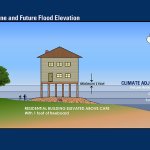VILLAS — Phragmites, the tall reeds that grow along waterways, get no respect. People poison them, burn them, tear them out of the ground with machines and they may be a cheap source of alternative energy.
Stan Smith, of Council Bluffs, Iowa is working on a project to use Phragmites to produce electricity. They grow all over Cape May County and are considered an evasive weed even though some were planted years ago by the Army Corps of Engineers to hold sand dunes together. He is South Dakota State University graduate with 20 years experience a design engineer followed by a career in product marketing and manufacturing management.
Smith said he would harvest Phragmites including the roots, grind them up and put them into a digester where microbes would eat them and create methane gas which could be used to run generators to make electricity or fed directly into the natural gas pipeline to supply homes.
He points to a digester operation at the Green Valley Dairy in Krakow, Wis. where manure from a herd of 2,500 cattle is enclosed in a tank system that excludes oxygen and is broken down by naturally occurring bacteria that produces biogas.
The dairy is using two anaerobic digesters on their farm to generate approximately four million kilowatt hours (kWh) of energy a year, which would be enough to power about 400 average Wisconsin, homes for one year.
Smith suggested using the former Ponderlodge, now owned by the state Department of Environmental Protection and called Villas Wildlife Management Area, as an “east coast lab to study Phragmites.”
Barbara Skinner, who is leading a drive to save the Ponderlodge estimates there are hundreds of acres of Phragmites growing in Cape May County and several acres on the property.
She has been gathering signatures on a petition to be sent to Gov. Jon Corzine requesting the lodge building and property be preserved as an environmental center.
Skinner said $4 million allocated by the state Division of Fish and Wildlife to demolish buildings and tear up asphalt pathways on the property would be better used to restore the lodge as an environmental center.
DEP is taking bids for demolition of buildings before summer.
Smith also suggested the county airport as a location for a series of digesters which could produce electricity 24 hours per day. He estimates the cost to build the first digester at about $3 million but additional units would cost $1.5 million to $2 million.
Smith said he was raised in central Iowa and developed an interest in evasive weeds related to farming. He said he looked at work from the University of Minnesota to convert cattails (plants) into ethanol and moonshine. He said the major problem is harvesting the Phragmites roots from the water.
Smith said he became aware of a major Phragmites problem on the Platte River in Nebraska where 125 miles of the reeds are starting to close down the river with as much as four feet of solid roots beneath them.
“I was asked by the sugar people in Scottsbluff, Neb. if we can we use Phragmites and cattails to make sugar,” said Smith. “This led to much discussion to find a tractor that would be able to go into 40 inches of water and have a very low ground weight per square foot, so as not to bury itself in the bottom of the river.”
He said a tractor was found, a Kootenay KMC 2100 which has tracks like a military tank and a scraper to slice the Phramites root ball small enough to be useful.
Smith is applying for $439,000 from the federal government since President Barack Obama is emphasizing alternative energy projects. The funds would allow Smith to place Phragmites in a digester in Michigan for 30 days, he said.
He said he needed to prove his tractor and scraper will work in the mud. Smith said he believes states or municipalities would be excited to get rid of Phragmites and make money at the same time.
Smith is also challenging the State of Nebraska legislature to put digesters in that state where there are 300,000 cattle which equates to $2 million of electricity a month from manure.
To harvest Phragmites from a river, approvals would be needed from both the Department of Environmental Protection and the Army Corp of Engineers since sand would also be taken from the river.
Taking Phragmites from the Platte River and manure from 300,000 cattle would generate $3 million dollars a month of energy, said Smith. He said one large digester could generate power for 70 to 80 homes.
As a “guestimate”, Smith estimated 60 acres of Phragmites would be needed to feed a digester here to produce methane. After being harvested, Phragmites grow back in three years.
Smith said a small amount of cow manure or calcium bicarbonate would be needed in the digester to neutralize the acid from Phragmites.
While there are few cows in Cape May County to produce the small amount of manure needed to use in the digesters, calcium bicarbonate may be used as a substitute for manure which may be found in clamshells.
When George Washington Carver began working with peanuts, they were considered an invasive plant, said Smith.
He said Iowa State University would like to have half a semi-trailer load of ground up Phragmites roots because they believe by placing 50 percent calcuim carbonate in it, they can make it into cattle feed.
Smith said a rough estimate finds 15 million acres of Phragmites in the U.S. and 25 million acres of cattails.
“It is believed both of these can be made into ethanol,” he said.
About half the states in the nation have Phragmites problems including New Jersey, Pennsylvania, Delaware and New York.
“It isn’t going to get any better until we find a useful solution,” said Smith. “They are going to be nuisance until we find a use.”
Stone Harbor – Bob Ross thank you for all your years of volunteer service to the community of Stone Harbor. A Lifelong resident And property owner. 10 years on school board, 6 years on zoning board they can't…








